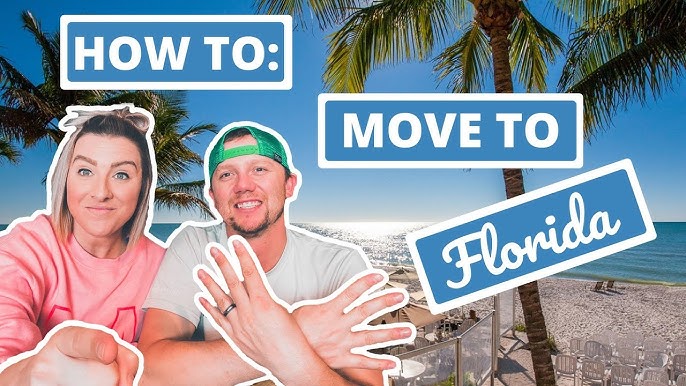Dreaming of sunny beaches and vibrant living in Florida? Moving to Florida without a job may seem challenging, but it’s possible with the right strategy. In this guide, we’ll cover practical steps for making your move to the Sunshine State a reality, even without a job lined up. From budgeting tips to exploring opportunities, you’ll discover how to navigate the process and kickstart your Florida adventure.
Tips To Move To Florida Without Job
Research Affordable Living Areas
Moving to Florida without a job requires strategic planning, and the first step is researching affordable living areas within the state. Florida is diverse, and the cost of living can vary significantly from one city to another. Explore different regions, considering factors such as housing costs, utility expenses, and overall affordability. Look into smaller towns or suburbs that may offer a more budget-friendly lifestyle while still providing access to necessary amenities. Online resources, community forums, and local insights can guide you in identifying areas that align with your financial constraints. You can read our article on how to move to Florida no money.
Save Money for Living Expenses
Building a financial cushion is essential when relocating without a job. Start saving money well in advance to cover living expenses, including rent, utilities, and groceries. Calculate your estimated monthly costs and aim to have several months’ worth of living expenses set aside. This financial buffer provides a safety net while you search for employment opportunities in Florida. Cutting unnecessary expenses in the months leading up to your move can help you accumulate the funds needed for a smoother transition.
Establish a Budget
Creating a detailed budget is a critical aspect of moving to Florida without a job. Identify all potential expenses, including housing, transportation, food, and healthcare. Factor in one-time costs like moving expenses and security deposits. Allocate your savings strategically across these categories, ensuring that you have a clear understanding of your financial situation. A well-organized budget helps you make informed decisions, prioritize spending, and avoid unnecessary financial stress. Regularly review and adjust your budget as needed, especially as you settle into your new Florida lifestyle and potentially secure employment.
Look for Job Opportunities Online
In the digital age, job hunting has become more accessible than ever. Utilize online platforms to search for job opportunities in Florida. Websites like Indeed, LinkedIn, and Glassdoor can be valuable resources for finding employment openings. Tailor your resume to highlight your skills and experience, and actively apply to positions that align with your qualifications. Consider reaching out to recruitment agencies and attending virtual job fairs. Virtual networking can help you establish connections and increase your visibility in the job market, enhancing your chances of securing employment in Florida.
Network with Locals
Building a local network is crucial when moving without a job. Attend community events, join social groups, and participate in networking functions to meet residents and professionals in your area of interest. Engage with local organizations, both online and in person, to gain insights into the job market and potential opportunities. Networking not only provides valuable information but also opens doors to hidden job prospects. Establishing a presence within the local community can lead to referrals and introductions that may prove instrumental in your job search.
Explore Low-Cost Housing Options
To stretch your budget further, explore low-cost housing options in Florida. Consider shared housing arrangements, rental apartments, or co-living spaces that offer more affordable alternatives to traditional housing. Research available subsidies or assistance programs for housing to ease the financial burden. Be open to exploring different neighborhoods or towns that may have lower living costs. Online housing platforms, community bulletin boards, and local real estate websites can be valuable resources for finding budget-friendly housing options that suit your needs.
Consider Temporary or Gig Work
When initially moving to Florida without a job, consider taking on temporary or gig work to generate income while you search for a more permanent position. This could include freelance opportunities, temporary contracts, or part-time roles. Platforms like TaskRabbit, Upwork, and local job boards may have short-term opportunities that align with your skills. Not only does this provide a source of income, but it also keeps you active in the workforce, building your resume and potentially leading to more permanent opportunities.
Leverage Transferable Skills
Identify and leverage transferable skills that can be applied across different industries. Highlight these skills in your job applications and during networking events. Emphasizing skills such as communication, problem-solving, and adaptability can make you a valuable asset to employers in various fields. Consider how your previous experiences and expertise can be adapted to different roles, broadening your job search and increasing your chances of finding employment in Florida.
Plan for Healthcare Coverage
Securing healthcare coverage is essential, especially when moving without a job. Research healthcare options available in Florida, including private insurance plans, government-sponsored programs, or options provided by local community clinics. Plan for the costs associated with healthcare coverage and explore ways to mitigate these expenses. Understanding the healthcare landscape in your new location ensures that you have access to necessary medical services and can address potential health concerns without undue financial strain.
Research Community Resources
Discover community resources that can provide support during your transition. Local organizations, career centers, and workforce development programs may offer job-search assistance, resume workshops, and networking events. Investigate food banks, community assistance programs, and other resources that can help with immediate needs. Connecting with local social services and support networks can provide a safety net as you navigate the challenges of moving without a job.
READ ALSO: 10 Best Neighborhoods In Dayton

